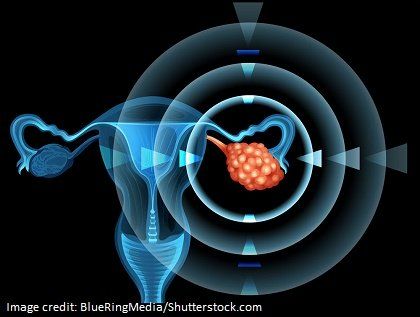Checkpoint Inhibitor May Help Improve Outcomes in Ovarian Cancer Patients
Researchers are hoping that adding a checkpoint inhibitor to the treatment armamentarium may help improve outcomes in patients with locally advanced or metastatic disease epithelial ovarian cancer.

Researchers are hoping that adding a checkpoint inhibitor to the treatment armamentarium may help improve outcomes in patients with locally advanced or metastatic disease (stage III/IV) epithelial ovarian cancer.
A phase III study, JAVELIN Ovarian 100, is now beginning and it will evaluate the efficacy and safety of avelumab (MSB0010718C) in combination with, and/or as maintenance treatment to, platinum-based chemotherapy in patients with previously untreated epithelial ovarian cancer. JAVELIN Ovarian 100 is the first phase III study evaluating the addition of an immune checkpoint inhibitor to standard-of-care in first-line treatment for this patient population.
“In an early ongoing study, avelumab showed encouraging tumor response rates in patients with recurrent or refractory ovarian cancer,” said Alise Reicin, MD, who heads up Global Clinical Development at the biopharma business of Merck KGaA, Darmstadt, Germany, which in the US and Canada operates as EMD Serono, in a press release. “Historically, ovarian cancer presents as an advanced disease with poor survival rates. The hope is that avelumab can change the natural history of the disease and potentially take the survival rate beyond the current five year estimate.”
JAVELIN Ovarian 100 is an open-label, international, multicenter, randomized (1:1:1) trial designed to evaluate the potential superiority of two first-line therapies with avelumab and platinum-based chemotherapy versus platinum-based chemotherapy alone, as assessed by progression-free survival (PFS). The study will enroll approximately 950 patients and they will receive concurrent avelumab and chemotherapy, avelumab following chemotherapy, or chemotherapy alone.
The investigators are hoping there will be synergistic activity in the combination of avelumab and established treatments such as platinum-based chemotherapy. Avelumab is an investigational, fully human anti-PD-L1 IgG1 monoclonal antibody. It is theorized that by inhibiting PD-L1 interactions, this agent enables the activation of T cells and the adaptive immune system.
As of May 2016, the complete JAVELIN clinical development program for avelumab has included approximately 2,200 patients being treated across more than 15 tumor types. This agent is being evaluated in patients with mesothelioma, Merkel cell carcinoma, gastric/gastroesophageal junction cancer, urothelial carcinoma, adrenocortical carcinoma, NSCLC (non-small cell lung cancer) and renal cell carcinoma.
For this current phase III trial, eligible patients must have previously untreated, histologically confirmed stage III/IV epithelial ovarian (EOC), fallopian tube cancer (FTC), or primary peritoneal cancer (PPC) and be candidates for platinum-based chemotherapy. The primary outcome measures include PFS and secondary outcome measures include overall survival (OS), maintenance PFS, duration of response (DR), and objective response rate (ORR).